4BChapter3复习提要-黄璐
三、四章提纲
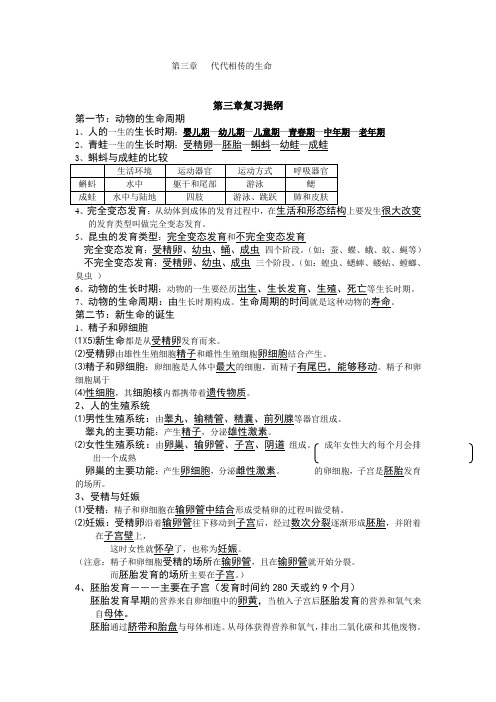
第三章代代相传的生命第三章复习提纲第一节:动物的生命周期1、人的一生的生长时期:婴儿期—幼儿期—儿童期—青春期—中年期—老年期2、青蛙一生的生长时期:受精卵—胚胎—蝌蚪—幼蛙—成蛙3、蝌蚪与成蛙的比较生活环境运动器官运动方式呼吸器官蝌蚪水中躯干和尾部游泳鳃成蛙水中与陆地四肢游泳、跳跃肺和皮肤4、完全变态发育:从幼体到成体的发育过程中,在生活和形态结构上要发生很大改变的发育类型叫做完全变态发育。
5、昆虫的发育类型:完全变态发育和不完全变态发育完全变态发育:受精卵、幼虫、蛹、成虫四个阶段。
(如:蚕、蝶、蛾、蚊、蝇等)不完全变态发育:受精卵、幼虫、成虫三个阶段。
(如:蝗虫、蟋蟀、蝼蛄、螳螂、臭虫)6、动物的生长时期:动物的一生要经历出生、生长发育、生殖、死亡等生长时期。
7、动物的生命周期:由生长时期构成。
生命周期的时间就是这种动物的寿命。
第二节:新生命的诞生1、精子和卵细胞⑴⑸新生命都是从受精卵发育而来。
⑵受精卵由雄性生殖细胞精子和雌性生殖细胞卵细胞结合产生。
⑶精子和卵细胞:卵细胞是人体中最大的细胞,而精子有尾巴,能够移动。
精子和卵细胞属于⑷性细胞,其细胞核内都携带着遗传物质。
2、人的生殖系统⑴男性生殖系统:由睾丸、输精管、精囊、前列腺等器官组成。
睾丸的主要功能:产生精子,分泌雄性激素。
⑵女性生殖系统:由卵巢、输卵管、子宫、阴道组成。
成年女性大约每个月会排出一个成熟卵巢的主要功能:产生卵细胞,分泌雌性激素。
的卵细胞,子宫是胚胎发育的场所。
3、受精与妊娠⑴受精:精子和卵细胞在输卵管中结合形成受精卵的过程叫做受精。
⑵妊娠:受精卵沿着输卵管往下移动到子宫后,经过数次分裂逐渐形成胚胎,并附着在子宫壁上,这时女性就怀孕了,也称为妊娠。
(注意:精子和卵细胞受精的场所在输卵管,且在输卵管就开始分裂。
而胚胎发育的场所主要在子宫。
)4、胚胎发育―――主要在子宫(发育时间约280天或约9个月)胚胎发育早期的营养来自卵细胞中的卵黄,当植入子宫后胚胎发育的营养和氧气来自母体。
新二小升初考点解析(5课四)-第4~-小升初英语黄璐老师
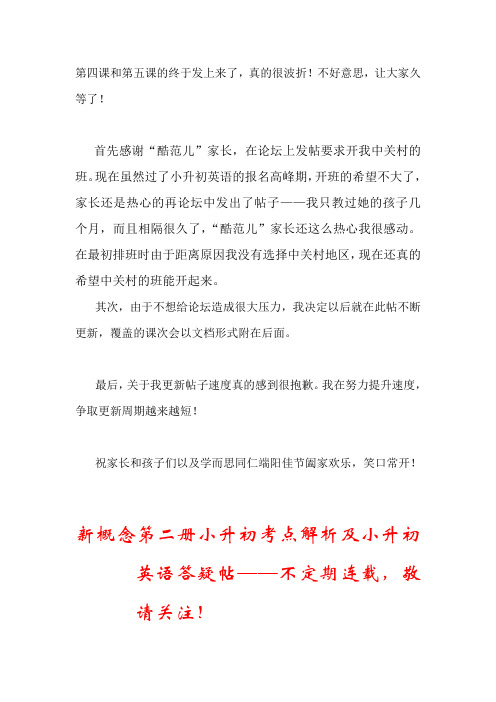
第四课和第五课的终于发上来了,真的很波折!不好意思,让大家久等了!首先感谢“酷范儿”家长,在论坛上发帖要求开我中关村的班。
现在虽然过了小升初英语的报名高峰期,开班的希望不大了,家长还是热心的再论坛中发出了帖子——我只教过她的孩子几个月,而且相隔很久了,“酷范儿”家长还这么热心我很感动。
在最初排班时由于距离原因我没有选择中关村地区,现在还真的希望中关村的班能开起来。
其次,由于不想给论坛造成很大压力,我决定以后就在此帖不断更新,覆盖的课次会以文档形式附在后面。
最后,关于我更新帖子速度真的感到很抱歉。
我在努力提升速度,争取更新周期越来越短!祝家长和孩子们以及学而思同仁端阳佳节阖家欢乐,笑口常开!新概念第二册小升初考点解析及小升初英语答疑帖——不定期连载,敬请关注!下面晒出的是第4~5课的考点:Lesson 4 An exciting tripLesson 5 No wrong numbers考点1:现在完成时(此考点附有讲解录音)。
之所以将两课放在一起,是因为两课中都含有现在完成时。
因为这个时态比其他时态复杂,所以这次我在文档后面又附了一个录音讲解,希望能有帮助。
两课中用到完成时的句子有:1)I have just received a letter from my brother, Tim.2) He has been there for six months.3) He has already visited a great number of places in Australia.4) He has just bought an Australian car and has gone to Alice Springs.5) My brother has never been abroad before.6) He has just bought another garage in Pinhurst.7)…he has just bought twelve pigeons.8) Up to now, Mr.Scott has sent a great many requests for spare parts…9)In this way, he has begun his own private telephone service.一、意义: 从现在回顾以前发生的事件,有以下两种情况:1.这个事件一直延续或不断重复到现在,或者还将延续或重复下去。
最新4B-Chapter-2复习提要-黄璐
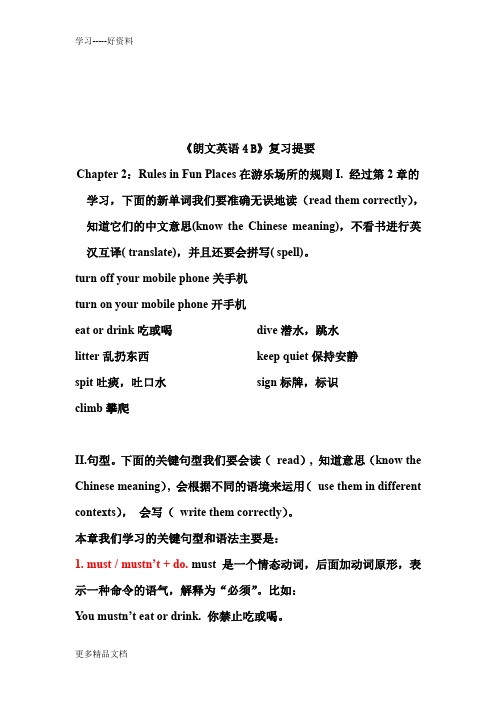
《朗文英语4 B》复习提要Chapter 2:Rules in Fun Places在游乐场所的规则I. 经过第2章的学习,下面的新单词我们要准确无误地读(read them correctly),知道它们的中文意思(know the Chinese meaning),不看书进行英汉互译( translate),并且还要会拼写( spell)。
turn off your mobile phone关手机turn on your mobile phone开手机eat or drink吃或喝litter乱扔东西spit吐痰,吐口水climb攀爬dive潜水,跳水keep quiet保持安静sign标牌,标识II.句型。
下面的关键句型我们要会读(read), 知道意思(know the Chinese meaning), 会根据不同的语境来运用(use them in different contexts),会写(write them correctly)。
本章我们学习的关键句型和语法主要是:1. must / mustn’t + do. must 是一个情态动词,后面加动词原形,表示一种命令的语气,解释为“必须”。
比如:You mustn’t eat or drink.你禁止吃或喝。
You mustn’t spi t. 你禁止乱扔垃圾。
Yo u mustn’t climb.你禁止攀爬。
You mustn’t run. 你禁止奔跑。
You mustn’t dive.你禁止潜水(跳水)。
2. No + doing,表示“禁止”。
这样的句子经常出现在公共场合的标语,用来警示他人。
比如:No eating or drinking. =You mustn’t eat or drin k.禁止吃或喝。
No spitting. =Y ou mustn’t spit. 禁止乱扔东西。
spit 要双写词尾‘t’,再加‘ing’.No clim bing. =You mustn’t climb.禁止攀爬。
2023届中考语文三轮冲刺专题复习《语句扩展》教学课件

语句扩展2023届中考语文三轮冲刺专题复习临河三中陈静1扩展语句定义:将指定的词、短语或句子,合理地扩展为一个较长的语句或语段,使其信息丰富充盈的一种考查形式。
常见考查形式:连词成文、句意丰富、补写续写、话题拓展、图表内涵。
【学习目标】1、了解语句扩展常见的几种题型;2、掌握语句扩展的方法。
3、考查重点情境式和续写式扩展。
5/15/2023临河三中陈静3一、连词成文(据词设境)•要求考生想象在某种语境中,将命题者提供的看似互不相关的若干词语,运用一定的表现手法,组成一个意思连贯完整的句子或段落。
根据下列两种情景,以“歌声”为重点,分别扩展成一段话,每段不少于30个字。
情景一:毕业典礼上同学们歌声情景二:考试前夕我歌声本题主要考查合理的联想、想像能力,因为扩展的内容要借助对生活经历的联想,进而设想(想像)两种具体的情景。
一般地说,“典礼”较为庄重。
但由于是毕业之际,又免不了心潮起伏,显得激动而热烈;多情者也许又有些依恋、惆怅……“在考试前”,心情又会因“我”而异:“我”是准备充分者,或反之;“我”是能力较强者,或反之;“我”身体健康,或考前突然病了;“我”家里情况一切正常,或突发变故。
这些心境,命题人是要求你必须对其有反映的。
答题时,就应当从这些方面去扩展,去想像。
1、夜晚,操场上彩旗招展,灯火通明,在学生会主席主持的毕业典礼上,面带笑容的同学们唱出的充满豪情的歌声在空中飘扬。
(没有以歌声为重点) 2、在毕业典礼上,同学们围成一圈,手拉着手,人人发自内心的唱出了一首团结的歌。
(重点落在“同学们”上。
) 评一评 议一议3、考试前的晚上,我吃了晚饭,出去走了一会儿,听到一阵歌声。
4、考试前夕,我唱起了《朋友》这支歌,不禁深情地怀念起了我们的老班长。
(语言苍白,没有具体描写“歌声” ) (忽略情境设置 )参考答案:情景一:毕业典礼上同学们歌声 在初三年级举行的毕业典礼上,同学们手拉着手,满怀激情地唱起了校歌,用歌声表达了他们对老师的感激,用歌声传达了他们对母校的热爱,用歌声唱出了他们对未来的憧憬,那歌声至今还萦绕在我的耳边。
2013年精篇阅读方法点拨(黄婕)
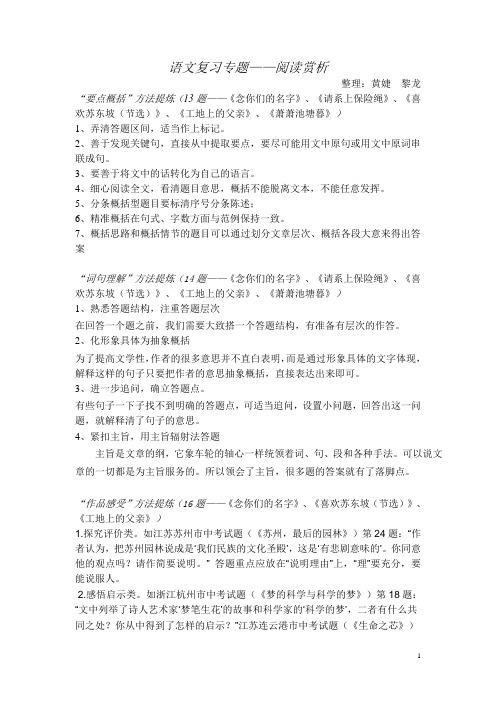
语文复习专题——阅读赏析整理:黄婕黎龙“要点概括”方法提炼(13题——《念你们的名字》、《请系上保险绳》、《喜欢苏东坡(节选)》、《工地上的父亲》、《萧萧池塘暮》)1、弄清答题区间,适当作上标记。
2、善于发现关键句,直接从中提取要点,要尽可能用文中原句或用文中原词串联成句。
3、要善于将文中的话转化为自己的语言。
4、细心阅读全文,看清题目意思,概括不能脱离文本,不能任意发挥。
5、分条概括型题目要标清序号分条陈述;6、精准概括在句式、字数方面与范例保持一致。
7、概括思路和概括情节的题目可以通过划分文章层次、概括各段大意来得出答案“词句理解”方法提炼(14题——《念你们的名字》、《请系上保险绳》、《喜欢苏东坡(节选)》、《工地上的父亲》、《萧萧池塘暮》)1、熟悉答题结构,注重答题层次在回答一个题之前,我们需要大致搭一个答题结构,有准备有层次的作答。
2、化形象具体为抽象概括为了提高文学性,作者的很多意思并不直白表明,而是通过形象具体的文字体现,解释这样的句子只要把作者的意思抽象概括,直接表达出来即可。
3、进一步追问,确立答题点。
有些句子一下子找不到明确的答题点,可适当追问,设置小问题,回答出这一问题,就解释清了句子的意思。
4、紧扣主旨,用主旨辐射法答题主旨是文章的纲,它象车轮的轴心一样统领着词、句、段和各种手法。
可以说文章的一切都是为主旨服务的。
所以领会了主旨,很多题的答案就有了落脚点。
“作品感受”方法提炼(16题——《念你们的名字》、《喜欢苏东坡(节选)》、《工地上的父亲》)1.探究评价类。
如江苏苏州市中考试题(《苏州,最后的园林》)第24题:“作者认为,把苏州园林说成是…我们民族的文化圣殿‟,这是…有悲剧意味的‟。
你同意他的观点吗?请作简要说明。
”答题重点应放在“说明理由”上,“理”要充分,要能说服人。
2.感悟启示类。
如浙江杭州市中考试题(《梦的科学与科学的梦》)第18题:“文中列举了诗人艺术家…梦笔生花‟的故事和科学家的…科学的梦‟,二者有什么共同之处?你从中得到了怎样的启示?”江苏连云港市中考试题(《生命之芯》)第23题:“阅读全文,你从葡萄叶子夭折的生命历程中得到了什么感悟?”这种阅读体验、感悟或启示,不能脱离作品,天马行空式地随意漫谈,必须结合作品内容、作品意蕴来展开。
4《泛读教程》黄灏doc
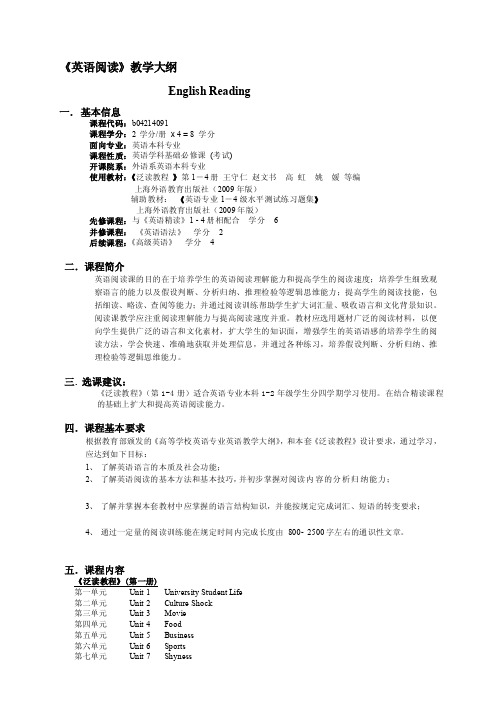
《英语阅读》教学大纲English Reading一.基本信息课程代码:b04214091课程学分:2 学分/册x 4 = 8 学分面向专业:英语本科专业课程性质:英语学科基础必修课(考试)开课院系:外语系英语本科专业使用教材:《泛读教程》第1-4册王守仁赵文书高虹姚媛等编上海外语教育出版社(2009年版)辅助教材:《英语专业1-4级水平测试练习题集》上海外语教育出版社(2009年版)先修课程:与《英语精读》1 - 4册相配合学分6并修课程:《英语语法》学分2后续课程:《高级英语》学分4二.课程简介英语阅读课的目的在于培养学生的英语阅读理解能力和提高学生的阅读速度;培养学生细致观察语言的能力以及假设判断、分析归纳、推理检验等逻辑思维能力;提高学生的阅读技能,包括细读、略读、查阅等能力;并通过阅读训练帮助学生扩大词汇量、吸收语言和文化背景知识。
阅读课教学应注重阅读理解能力与提高阅读速度并重。
教材应选用题材广泛的阅读材料,以便向学生提供广泛的语言和文化素材,扩大学生的知识面,增强学生的英语语感的培养学生的阅读方法,学会快速、准确地获取并处理信息,并通过各种练习,培养假设判断、分析归纳、推理检验等逻辑思维能力。
三. 选课建议:《泛读教程》(第1-4册)适合英语专业本科1-2年级学生分四学期学习使用。
在结合精读课程的基础上扩大和提高英语阅读能力。
四.课程基本要求根据教育部颁发的《高等学校英语专业英语教学大纲》,和本套《泛读教程》设计要求,通过学习,应达到如下目标:1、了解英语语言的本质及社会功能;2、了解英语阅读的基本方法和基本技巧,并初步掌握对阅读内容的分析归纳能力;3、了解并掌握本套教材中应掌握的语言结构知识,并能按规定完成词汇、短语的转变要求;4、通过一定量的阅读训练能在规定时间内完成长度由800- 2500字左右的通识性文章。
五.课程内容《泛读教程》(第一册)第一单元Unit 1 University Student Life第二单元Unit 2 Culture Shock第三单元Unit 3 Movie第四单元Unit 4 Food第五单元Unit 5 Business第六单元Unit 6 Sports第七单元Unit 7 Shyness第八单元Unit 8 Native People第九单元Unit 9 Bible Stories第十单元Unit 10 Festivals and Holidays第十一单元Unit 11 Advertising第十二单元Unit 12 Agriculture《泛读教程》(第二册)第一单元Unit 1 Reading第二单元Unit 2 Music第三单元Unit 3 Generation第四单元Unit 4 Weather and Climate第五单元Unit 5 Work第六单元Unit 6 The African A merican第七单元Unit 7 Greek Stories第八单元Unit 8 Attitude Towards Life第九单元Unit 9 First Aid第十单元Unit 10 Marriage第十一单元Unit 11 Creativity第十二单元Unit 12 Travel《泛读教程》(第三册)第一单元 Unit 1 Reading Strategies第二单元 Unit 2 Education第三单元 Unit 3 Body language第四单元 Unit 4 Animals第五单元 Unit 5 History第六单元 Unit 6 Language第七单元 Unit 7 Space第八单元 Unit 8 Women第九单元 Unit 9 Cities第十单元 Unit 10 Cross-cultural Communication 第十一单元 Unit 11 Information Retrieval第十二单元 Unit 12 Environment《泛读教程》(第四册)第一单元Unit 1 Language Testing第二单元Unit 2 Exploration第三单元Unit 3 Refugee第四单元Unit 4 Cigarettes第五单元Unit 5 Globalization第六单元Unit 6 Immigrants第七单元Unit 7 Ecology第八单元Unit 8 Holocaust第九单元Unit 9 Diplomatic Practice第十单元Unit 10 Christianity第十一单元Unit 11 Politics第十二单元Unit 12 Art六.课内实验名称及基本要求(略)七.教学进度(第1 - 4册基本进度如下 , 可作适当调整)第一单元 2 课时/周第二单元 2 课时/周第三单元 2 课时/周第四单元 2 课时/周第五单元 2 课时/周第六单元 2 课时/周第七单元 2 课时/周第八单元 2 课时/周第九单元 2 课时/周第十单元 2 课时/周第十一单元 2 课时/周第十二单元 2 课时/周八.作业按照教材每章节作业分为两个部分;1.课前预习课堂必须要求全部完成的部分。
(完整版)朗文4AChapter3复习提要

《朗文英语4A》复习提要Chapter 3:When our grandparent s were young当我们爷爷奶奶(外婆外公)小的时候I. 经过第3章的学习,下面的新单词我们要准确无误地读(read them correctly),知道它们的中文意思(know the Chinese meaning),不看书进行英汉互译(translate),并且还要会拼写(spell)。
*注意:an air-con 一台空调II.句型。
下面的关键句型我们要会读(read), 知道意思(know the Chinese meaning), 会根据不同的语境来运用(use them in different contexts),会写(write them correctly)。
-- Was there any cola when you were young,G randpa?-- Yes, there was. (肯定回答)-- Was there any fast food when you were young?-- No, there wasn’t.(否定回答)-- Were there any air-con s when you were young, G randma?-- Yes, there were.(肯定回答)-- Were there any mobile phone s when you were young, G randma? -- No, there weren ’t .(否定回答)总结:当名词是可数名词单数或不可数名词时,be 动词用单数(is ,was)。
当主语是可数名词的复数时, be 动词用复数(are, were )。
总结如下:is/was + 不可数名词/ 可数名词单数are/were + 可数名词复数some 和any 的用法如下:some 用在肯定句中any 用在疑问句或否定句中 *注意:Grandpa 和Grandma 一般用语口语称呼,其结构一般是“…,Grandpa/Grandma ”。
4BChapter5复习提要黄璐

4BChapter5复习提要黄璐《朗⽂英语4 B》复习提要Chapter 5:Food from around the world来⾃全世界的⾷物I.PartA经过第1章的学习,下⾯的新单词我们要准确⽆误地读(read them correctly),知道它们的中⽂意思(know the Chinese meaning),不瞧书进⾏英汉互译( translate),并且还要会拼写( spell)。
1、Italy意⼤利2、France法国3、Japan⽇本4、America美国5、China 中国注意:国家名称⾸字母要⼤写6、from around the world来⾃全世界7、international国际的8、Fr an ce法国9、Fr en ch 法语、法国⼈、法国的eg、He is a French, so he can speak French、她就是⼀个法国⼈,所以她会说法语。
He is from France, but he can’t speak French、她来⾃法国,但就是她不会说法语。
It is French food,and I like it very much、它就是法国的⾷物,我很喜欢它。
10、come from =be from 来⾃eg、I come from China、= I am from China、He comes from Italy、= He is from Italy、We come from Japan、= We are from Japan、Where do you come from= Where are you fromShe doesn’t come from Ch ina、= She isn’t from China、II句型。
下⾯的关键句型我们要会读( read), 知道意思(know the Chinese meaning), 会根据不同的语境来运⽤( use them in different contexts), 会写( write them correctly)。
统编版选择性必修上册第8课《大卫科波菲尔》课件PPT课件

总结
小说通过大卫·科波菲尔这个孩子的眼睛展现了十九世纪英国底层的社 会生活,写出了周围的人物和环境对他成长的影响,既表达了作者对人世 间善良、宽厚、仁爱等美德的赞美,同时也蕴含着对当时社会的批评。
知识回顾
小说中的环境描写具有什么作用?
自主分析
作者以“童年”的视角进行叙述,有什么好处?
以一个儿童的视角来讲述故事,好处有: (1)使故事更客观、真实; (2)叙述的语言更平易、亲切; (3)儿童的好奇心能推动故事情节的发展,使人物形象更立体、饱满 (4)用儿童的天真善良的天性对照成人世界的丑陋。审视人性,凸显主题, 直扣人心。
自主分析
大卫·科波菲尔 狄更斯
学习目标
第一课时
1、了解作者查尔斯•狄更斯,了解小说创作背景。 2、梳理并把握小说情节。 3、把握小说人物的形象特征,学习小说通过外貌描写、语 言描写、动作描写等塑人物形象的方法。
4、体会作者对人物的情感。
冷酷的社会
19世纪中叶的维多利亚时代,英国经济正处
写
于迅速发展期,但社会繁华的表象下隐藏着贫富
本文的线索是什么?请简要分析。
以“我”的成长/“我”的所见所闻/“我”的经历为主要线索展开情节的。 通过结识米考伯夫妇,紧扣“成长”这一线索,体现了“我”的善良以及对造 成米考伯夫妇这一切社会根源的深刻批评。
黄廖本《现代汉语》(下)复习提纲

黄廖本《现代汉语》(下)复习提纲第五章语法1.语法的两层含义。
语法的三大性质。
四级语法单位。
2.划分词类的标准。
什么叫词的语法功能、形态和意义?各类词的语法特点。
3.什么叫词的兼类?兼类和活用的区别。
4.短语组合的语法手段。
短语的结构分类和功能分类。
复杂短语和多义短语的层次分析。
5.理解各种句子成分的构成材料、意义类型。
6.认识和理解独立语。
7.掌握句类和句型。
主谓句分哪几类?非主谓句分哪几类?掌握一般的动词谓语句之外的把字句、被字句、连谓句、兼语句、双宾句、存现句、变式句和省略句。
初步掌握句子变换分析的方法。
8.用成分分析法和层次分析法分析句子。
9.单复句的区别。
复句和关联词语的关系。
复句的类型。
多重复句分析的完整步骤。
紧缩句的辨识。
10.词类、单句、复句运用的常见错误。
第六章修辞1.什么叫修辞?2.怎样理解修辞和语境的关系?3.怎样理解修辞同语音、词汇、语法的关系?4.词语意义的锤炼由哪些要求?5.词语声音的锤炼有哪些要求?6.长句和短句各有什么特点和作用?7.整句和散句各有什么特点和作用?8.主动句和被动句的表述作用有什么不同?9.肯定句和否定句的表述作用有什么不同?10.掌握辞格:比喻、比拟、借代、拈连、夸张、双关、仿词、反语、婉曲、对偶、排比、层递、顶真、回环、对比、映衬、反复、设问、反问、通感、警策。
11.掌握辞格综合运用的三种形式。
12.能分析修辞运用中出现的一些问题。
13.理解公文语体、科技语体、政论语体、文艺语体的不同风格。
高二年级生物导学提纲选修3(十五)选修班
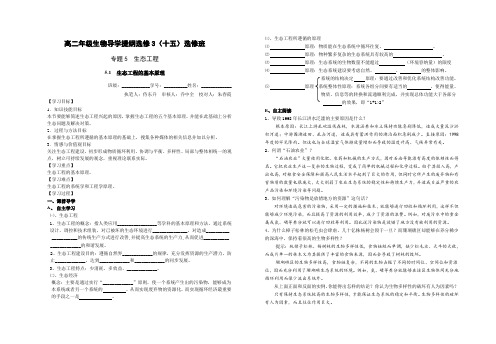
高二年级生物导学提纲选修3(十五)选修班专题5 生态工程5.1 生态工程的基本原理班级:____________学号:__________姓名:_____________执笔人:侍东升审核人:乔中全校对人:朱春霞【学习目标】1.知识技能目标本节要能够简述生态工程兴起的原因,掌握生态工程的五个基本原理,并能在此基础上分析生态问题及解决对策。
2.过程与方法目标在掌握生态工程所遵循的基本原理的基础上,搜集各种媒体的相关信息并加以分析。
3.情感与价值观目标关注生态工程建设,初步形成物质循环利用、协调与平衡、多样性、局部与整体相统一的观点,树立可持续发展的观念,重视理论联系实际。
【学习重点】生态工程的基本原理。
【学习难点】生态工程的系统学和工程学原理。
【学习过程】一、课前导学A、自主学习㈠、生态工程1、生态工程的概念:指人类应用_________________等学科的基本原理和方法,通过系统设计、调控和技术组装,对已被坏的生态环境进行_______________,对造成__________ ___________的传统生产方式进行改善,并提高生态系统的生产力,从而促进___________ _____________的和谐发展。
2、生态工程建设目的:遵循自然界_____________的规律,充分发挥资源的生产潜力,防止_____________,达到_____________和_____________的同步发展。
3、生态工程特点:少消耗、多效益、_____________。
㈡、生态经济概念:主要是通过实行“_____________”原则,使一个系统产生出的污染物,能够成为本系统或者另一个系统的,从而实现废弃物的资源化,而实现循环经济最重要的手段之一是。
㈢、生态工程所遵循的原理⑴原理:物质能在生态系统中循环往复,。
⑵原理:物种繁多复杂的生态系统具有较高的。
⑶原理:生态系统的生物数量不能超过(环境容纳量)的限度⑷原理:生态系统建设要考虑自然、、的整体影响。
研究生英语读写提高级 课文4B A Pill for Loneliness
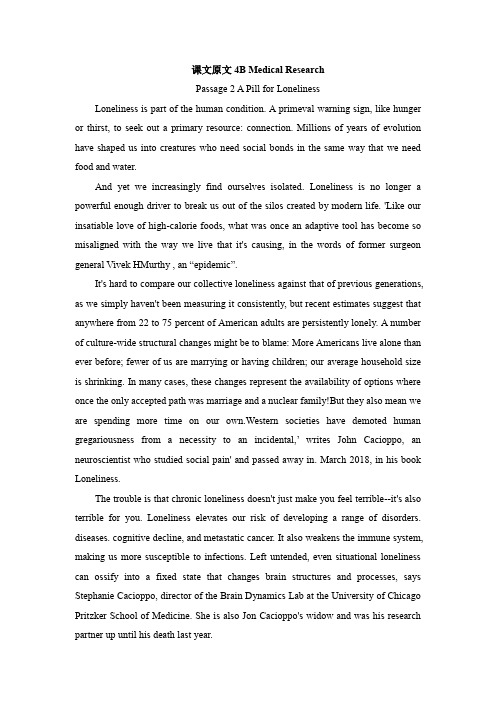
课文原文4B Medical ResearchPassage 2 A Pill for LonelinessLoneliness is part of the human condition. A primeval warning sign, like hunger or thirst, to seek out a primary resource: connection. Millions of years of evolution have shaped us into creatures who need social bonds in the same way that we need food and water.And yet we increasingly find ourselves isolated. Loneliness is no longer a powerful enough driver to break us out of the silos created by modern life. 'Like our insatiable love of high-calorie foods, what was once an adaptive tool has become so misaligned with the way we live that it's causing, in the words of former surgeon general Vivek HMurthy , an “epidemic”.It's hard to compare our collective loneliness against that of previous generations, as we simply haven't been measuring it consistently, but recent estimates suggest that anywhere from 22 to 75 percent of American adults are persistently lonely. A number of culture-wide structural changes might be to blame: More Americans live alone than ever before; fewer of us are marrying or having children; our average household size is shrinking. In many cases, these changes represent the availability of options where once the only accepted path was marriage and a nuclear family!But they also mean we are spending more time on our own.Western societies have demoted human gregariousness from a necessity to an incidental,’ writes John Cacioppo, an neuroscientist who studied social pain' and passed away in. March 2018, in his book Loneliness.The trouble is that chronic loneliness doesn't just make you feel terrible--it's also terrible for you. Loneliness elevates our risk of developing a range of disorders. diseases. cognitive decline, and metastatic cancer. It also weakens the immune system, making us more susceptible to infections. Left untended, even situational loneliness can ossify into a fixed state that changes brain structures and processes, says Stephanie Cacioppo, director of the Brain Dynamics Lab at the University of Chicago Pritzker School of Medicine. She is also Jon Cacioppo's widow and was his research partner up until his death last year.As a scientist, Stephanie Cacioppo has often viewed her life as an experiment. When John died, the practical elements of their joint research took on an urgent personal relevance. “My husband was the love of my life,” she says“I am living proof of my science. I apply it every day.?People sometimes compare social loss to physical pain but Stephanie finds the analogy inaccurate. After John's death, she went on long, punishing runs, pushing herself in near-freezing temperatures until her muscles and lungs screamed.“I could handle the pain because I knew it would have an end,”she says.“The physical pain associated with running was less intense than the deep, heartfelt emotional pain of the loss of the love of my life ,;Stephanie says she's now relying on many of the social fitness exercises that the couple validated together, such as making an effort to express gratitude, doing something nice for someone else without expecting something in return choosing to engage with strangers, and sharing good news with others.She has also found relief in her work and in continuing with others.her husband's legacy: “If you have a sense of worth and life with a purpose, you will feel less lonely,” Stephanie says. Today, that means continuing a body of research that she and her late husband were beginning to explore: a pill for loneliness.It's less science fiction than it sounds. A number of clinical trials--led by Stephanie and others-are already underway, targeting the ways in which chronic loneliness changes the brain, as well as the havoc it unleashes on the nervous system. If there are pharmacological treatments for other social pains like depression and anxiety, why no loneliness?Like depression and anxiety, loneliness is a universal part of the human experience. Unlike depression and anxiety, loneliness has no recognized clinical form; there is no available diagnosis or treatment for feeling chronically isolated.Ellen Hendriksen, a clinical psychologist who specializes in anxiety, envisions a future in which that's no longer the case. Currently, social anxiety is considered a disorder only when it causes enough distress or impairment to interfere with a person's life. She can see the same distinction working for loneliness:“Maybe we'llcall this social isolation syndrome,”Hendriksen suggests, adding that she thinks many of her patients would fit the criteria. Some people tell her that she's the only person they interact with for an extended period of time during the week.“Loneliness,according to Stephanie Cacioppo, is the result of biological signals that push us to reach out to others interacting with a dysfunctional mind that perceives social danger everywhere. She focused on a promising intervention: a neurosteroid called pregnenolone, which has been shown to improve stress-related disorders and ease the hyper vigilance in the brain that arises when a person is exposed to social threats. Cacioppo's goal is not to make people stop feeling lonely altogether, but to interfere with the ways loneliness affects the brain and body.When mice are socially isolated, their levels of pregnenolone decrease, a shift that also occurs in lonely humans. In a 2013 study of 31 healthy people, another research team found that giving people oral doses of a compound called allopregnanolone--derived from pregnanolone--had a calming effect on the participants’ amygdala and insula, which are the regions of the brain responsible for threat detection,emotional recall, and the anticipation of unpleasant reactions.The Cacioppos started focusing on pregnenolone and allopregnanolone after preclinical trials showed that the compound could counteract some of the loneliness.related biological changes in brain and was well-tolerated in humans. Some antidepressants provide a similar effect burcome with undesirable side effects, like drowsiness, nausea and insomnia.“**************************************************************** of lonely individuals, then we could have them reconnect, rather than withdraw from others,” Stephaniesays.That's the basis for her most recent study, where (6researchers administered 400-milligram oral doses of pregnenolone to lonely but otherwise healthy individuals. The trial ran from May 2017 to June 2019; Stephanie and her team are now in the process of analyzing the data. She's cautiously optimistic that the results will show significantly reduced perceived loneliness among the people who received pregnenolone versus those who received a placebo. Just as thirst is a signal that youare dehydrated.loneliness is an indication that you are already suffering from a lack of connection.Another 2016 review of pharmacological treatments co-authored by the Cacioppos explored the possibility of giving people the hormone oxytocin to combat chronic loneliness. Associated with breastfeeding, giving birth, and physical contact, the release of oxytocin in humans has been shown to “promote pro-social behaviors, affiliation, and trust,” the authors wrote.Meanwhile,Steve Cole, a professor of medicine psychiatry, and behavioral sciences at the UCLA School of Medicine who frequently collaborated with the Cacioppos is exploring how to mitigate the way loneliness makes the body susceptible to a host of diseases. Beta blockers, a heart medication developed in the 1960s, inhibit the body’s response to adrenaline and might also “turn out to be great at disconnecting the psychological experience of social threat and uncertainty from its biological consequences in the periphery, Cole says. “Even if we can't stop loneliness with a brain-targeted drug, we might still be able to protect lonely people from the adverse health consequences ,Cole is hoping to validate the drug's ability to reduce the impact of stress on the body. At the moment, he is studying the impact of beta blockers on cancer patients as stress has been shown to exacerbate the spread of the disease. If effective, there's reason to believe beta blockers could alleviate the destructive biological consequences of loneliness.In a dizzying number of ways, modern life is designed to disengage us from one another. And with such obvious barriers to connection, it may not seem worthwhile to pursue a pharmaceutical solution.“We are such a medicated comfortably numb society, Bainbridge says. In her own life, she sees loneliness not as a problem to be fixed, but a complicated, ambivalent state that adds depth to the experience of being a social creature in a fragmented world.At least for now, there remain nonpharmacological strategies to rely on. If you're feeling the pain of social isolation but have a support system, it can pay to tell the people closest to you what you need. Last spring was a particularly lonely time for Bainbridge. She had recently moved from New York City, where she had a solidgroup of friends, to Atlanta, where she knew virtually no one. “And so she requested a favor from her mom. The ask was simple:Text her every day in the morning with an update, question or random thought. The content mattered less than the act itself. “It really helped me she says. To this day, her mom still texts every morning.Actively searching for meaning in your life, whether it's by joining a volunteer organization, movement, or religious group, also helps. It's less about meeting other people, at least at first, and more about finding purpose and taking part in something larger than yourself, Cole says Self-focus promotes negative emotional states,’ while there is robust evidence that the “neurobiology of helping others is one of the most rewarding things a brain can do.”Stephanie Cacioppo has found a larger purpose in advancing the work she started with John. She recently heard a quote that has stuck with her: “Mozart didn't die; he became music," she says. “I believe my husband didn't die; he became theory. I am applying his theory.” (1637 words)。
语文:第三单元-复习-课件(1)(语文版八年级下册)(2019年12月整理)

积累一批词语
• 【寻欢作乐】 追求享乐放纵的生活。 • 【肆无忌惮】 任意妄为,无所畏忌。 • 【时来运转】 时机来临,命运开始好转。 • 【死乞白赖】 指纠缠不休。 • 【俏皮】 课文中指说话幽默、风趣。 • 【扯淡(dàn)】 课文中指胡说乱道。此外还指①闲扯。②没意思;
冷落;调零。②疏散;稀疏。③匮乏;简陋。 • 【世故】课文中指世俗人情,处世经验。 • 【凄楚】凄惨痛苦。 • 【愤慨】气愤不平,愤恨感慨。 • 【狞(níng)笑】凶恶地笑。 • 【抽咽】一吸一顿地哭泣,悲哀得说不出话来。[近义] 抽噎 • 【周济】用钱财等物质给别人帮助。 • 【呆若木鸡】痴呆得像木头做的鸡一样。形容因出于意料之外十分惊
积累一批词语
• 耍 ( shuǎ ) • 掷 ( zhì ) • 骚动( sāo) • 咳嗽( sòu ) • 滑稽( jī ) • 鹞子( yào ) • 糟蹋(tà ) • 作揖( yī )
积累一批词语
• 【凄凉】课文中指悲伤难过。原指①孤寂冷落。②凄惨。[近义] 凄楚 凄然
• 【嗫嚅(nièrú)】口动,形容想说话又吞吞吐吐,欲言又止的样子。 • 【安分守己】安守本分,规矩老实。 • 【萧条】课文中指政治、经济等不景气;衰微;衰退。原指①寂寞,
• 嗫嚅(nièrú) 薪水(xīn) 喃喃(nǎn) 倚着(yí)
瞅见(chǒu) 厌恶(wù) 狞笑(níng)
愤慨(gài) 抽咽(yè)
• 憋不住( biē ) 阉马( yān )
逮捕( dài )
• 龇牙( zī )
跺脚( duò )
爵士( jué ) 谣言( yáo )
•
; 物联卡加盟
;
地早就浇了,便把水费给了母亲,还特意拎来了他们从城里带来的新鲜水果,表示感谢。母亲
- 1、下载文档前请自行甄别文档内容的完整性,平台不提供额外的编辑、内容补充、找答案等附加服务。
- 2、"仅部分预览"的文档,不可在线预览部分如存在完整性等问题,可反馈申请退款(可完整预览的文档不适用该条件!)。
- 3、如文档侵犯您的权益,请联系客服反馈,我们会尽快为您处理(人工客服工作时间:9:00-18:30)。
《朗文英语4 B》复习提要Chapter 3 :Holiday Plans (假期计划) in Hong Kong 本章出现的所有香港地名只需要会读、知道意思,不要求拼写。
I. 经过第3章的学习,下面的新单词我们要准确无误地读 (read them correctly ),知道它们的中文意思(know the Chinese meaning) ,不看书进行英汉互译( translate) ,并且还要会拼写( spell)。
district 地区forget to do 忘记做某事a beautiful city 一个漂亮的城市in Hong Kong 在香港flag raising ceremony 升旗仪式go shopping 购物watch a performance ( watch performances )观看表演eat seafood 吃海鲜visit the open market 参观开放市场see the sea ani mals(see sea ani mal^t 海洋动物have lunch 吃午餐bay 海湾peak 山顶else其他Causeway Bay 铜锣湾Stanley 赤柱Ocean Park 海洋公园the Peak 太平山顶Wan Chai 湾仔Sai Kung 西贡Tsim Sha Tsui 尖沙咀II. 句型。
下面的关键句型我们要会读 (read),知道意思(know the Chinese meaning), 会根据不同的语境来运用 ( use them in different contexts),会写( write them correctly )。
本章我们学习的关键句型和语法主要是:1. will 表示将来时,后面加动词原型:will+do2. 问句答句时态保持一致。
问句用将来时,答句也用将来时。
3. at 后面一般跟小地点,比如at school, at hospital, at home, at the restaurant 等等。
4. in 后面一般跟大地点,比如国家和城市:in China, in Jiangsu, inNanjing 。
5. I will= I 'll--Where will you go in Hong Kong? 在香港,你将会去哪里?--I 'll goot Ocean Park. 我将会去海洋公园。
--What will you do there? 在那里(海洋公园) ,你将会做什么?--I ' II see the sea animals ther我将会去看海洋动物。
--Where elsewill you go in Hong Kong? 在香港,你还将去哪里?--I II go to Wan Cha我将会去湾仔。
--What will you do there? 在那里(湾仔),你将会做什么?--I ' II go to the flag aising ceremony.我将会去看升旗仪式。
--Where eIse wiII you go in Hong Kong? 在香港,你还将去哪里?--I II go to Causeway Ba我将会去铜锣湾。
--What wiII you do there? 在那里(铜锣湾),你将会做什么?--I II go shoppi ng there我将会在那里购物。
--Where eIse wiII you go in Hong Kong? 在香港,你还将去哪里?--I II go tcTsim Sha Tsui .我将会去尖沙咀。
--What wiII you do there? 在那里(尖沙咀),你将会做什么?--I ' II watch a performanee there我将会观看一场演出。
--Where eIse wiII you go in Hong Kong? 在香港,你还将去哪里--I II go to Sta nle我将会去赤柱。
--What wiII you do there? 在那里(赤柱),你将会做什么?--I 'II visit the open market there. 我将会游览开放市场。
--Where eIse wiII you go in Hong Kong? 在香港,你还将去哪里--I II go to Sai Kung我将会去西贡。
--What wiII you do there? 在那里(西贡),你将会做什么?--I II eat seafood ther我将会吃海鲜。
--Where eIse wiII you go in Hong Kong? 在香港,你还将去哪里--I ' II go to the Pea我将会去太平山顶。
--What will you do there? 在那里(太平山顶),你将会做什么?--I ' II have lunch there我将会吃午餐。
III. C部分学完后,你们要达到以下的要求哦。
1)可以准确而流利地背诵出C部分。
2)对于需要抄写的单词、短语和句子,要求会读、知道意思、知道在何种语境下运用、会拼写。
1. from发件人2. sent发送时间3. a.m.凌晨至中午12点的时间(a.m.和in the morning不重叠使用)4. p.m.(中午12点至凌晨)5. to收件人6. subject 主题7. news消息,新闻。
(不可数名词,不是复数)8. for a holiday(表示目的)9. on Sunday 在周日10. show…around带…四处转转11. especially 尤其、特别12. Can' t wait to see you等不及要见你了。
13. pen friend 笔友14. make plans 做计戈U15. this Sunday(前面不加介词,比如this year, this morning…)16. told (tell的过去时)告诉17. for her visit(名词)来访18. show sb sth二show sth to sb 带… 看…19. some of +复数名词:有些…20. float 漂浮21. maybe也许(一般放在句首)22. any othe叶复数名词,放在疑问句中。
23. suggesti on (suggest 的名词形式)建议24. First ・Next ・Then…After that Finally (事情的先后顺序)3)对于下面的一些词组和句型,我们要准确而流利地读出来、能够英汉互译、会拼写、还要会运用和拓展。
1.1 am going to come to Hong Kong for a holiday.be going to + do:将要做…(将来时)What are you going to do tomorrow?I am going to meet my friend at the airport.How are you going to travel?I am going to travel by bus.Who are you going to meet this weeke nd?I am going to meet my En glish teacher.2. Cherry 'pen friend was coming to Hong Kong for a holiday.(过去进行时)She was dancing whe n I saw her.They were doing their homework at 7p.m. last night .I was playing football when my mum came to pick me up.3. Do you have any other suggestions?some other+复数名词,放在肯定句中any other+ 复数名词,放在疑问句或否定句中I know they will invite some other people too.These books are not interesting. Do you have any other books?Sorry, there aren 'tany other books.IV. Part ENew words and phrases for Part E .E 部分新单词和词组。
要求:对于以下单词和词组要会读、会英汉互译、书上做笔记部分要会拼写。
cousin 堂兄妹,表兄妹November 11 月countryside 乡村,田园old building 老建筑to be visited 将被访问hotel 旅馆a day out 外出一天itinerary 行程in time order 按时间顺序heritage 遗产,遗迹wishing tree 许愿树pick sb up 接某人island 岛屿(‘ s'is silent)fishing village 渔村(fish 有钓鱼的意思)suggest 建议(suggestion 的名词)tour 旅行(名词)tour bus 观光巴士take back to 带回hope 希望too tired 太疲劳best wishes放在信的末尾,通常以复数形式出现,表示对对方的祝福。
Tai Po 大埔Yuen Long 元朗Lam Tsuen Wishing Tree 林村许愿树Lo Wai Walled Village 老围村Central 中环Repulse Bay 浅水湾Aberdeen Fishing Village 香港仔渔村Hong Kong Island 香港岛New sentences for Part E 要求:1. 对于书上出现的句子,要知道中文意思、会读、会拼写、会运用。
2. 能够用First …Next …Then …After that …Finally(At last)来写话。
3. I hope you will not be too tired.will be+ 名词、形容词、介词短语I will be a teacher next year.I think she will be happy tonight. Because I will buy a birthday cakefor her.I think they will be in the playground 2 hours later. Because they aregoing to have a PE lesson.V. Part F. 要求:知道中文意思,会读,能英汉互译brochure 小册子Buddha 佛像(‘h'is silent)Disneyland 迪斯尼(是个地名,首字母要大些)Part GVI .Part G. 要求: 会背。
